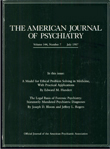Association analysis of the catechol O-methyltransferase gene and bipolar affective disorder
Abstract
OBJECTIVE: Catechol O-methyltransferase (COMT) is an enzyme that inactivates catecholamines. Two common COMT alleles determine high and low activity of the enzyme. Previous studies using biochemical methods found lower enzyme activity in patients with major depression and bipolar disorder in comparison with control values, suggesting that a dysfunction in catecholamine metabolism may be related to the etiology of depression. METHOD: The authors studied two recently described DNA polymorphisms at the COMT gene (a silent C256G mutation and a structural mutation, Val-108-Met) in 88 patients with bipolar disorder and in 113 healthy comparison subjects, all of Spanish origin. RESULTS: The frequency of the C256 allele was 0.58 in the patients and 0.54 in the comparison subjects. The frequency of the Val108 variant was 0.57 for both the patients and the comparison subjects. No allelic or genotypic associations were observed. CONCLUSIONS: The lack of association suggests that the COMT gene is not a major risk factor for bipolar disorder.



